Festivals
London Film Festival 2011: The S&S blog
Let’s start giving: early ups and downs
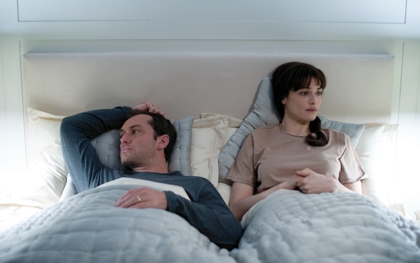
360
Nick James, 18 October
The LFF opening night already seems an age away. For me 360 was a typical example of the ‘We Are the World’ film, in which several minor story strands are intertwined to demonstrate the little-known fact that we’re all human underneath, no matter our country, race or social circumstance. These films – like Alejandro González Iñárittu’s Babel and Lukas Moodysson’s Mammoth – are weak echoes of much greater works on circumstantial collisions of people by Altman and Kieslowski, directors who better understood that the main enemy of such schemes is the certain pleased-with-itself patness that spoils this Fernando Meirelles / Peter Morgan collaboration.
That said, the airport storyline in which Anthony Hopkins, playing a father still looking for a long-lost daughter, intersects with Maria Flor’s cheated-on young Brazilian fleeing London – who in turn tries to come on to Ben Foster’s paroled sex-offender – was very deftly handled, and built towards an extraordinarily tense scene in Flor’s character’s hotel room. One of the film’s financers, who’s heard my complaint against this type of film before, saw me after the screening and sang the opening line to the Michael Jackson / Lionel Richie song at me – a classy provocation.
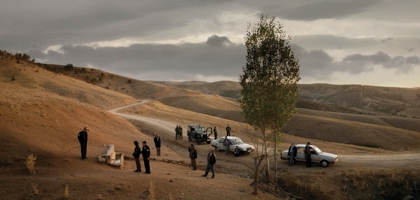
Once Upon a Time in Anatolia
Friday morning brought the great pleasure of watching a press screening for Nuri Bilge Ceylan’s Once Upon a Time in Anatolia. I’d seen this on the last day of Cannes, when my powers of concentration were suffering, and knew it was great. Second time with a refreshed mind it was even better than I’d thought. It’s an arthouse policier that follows a group of men gathered to find a corpse to which a confessed murderer is trying but failing to guide them. The proceedings involve a long drive through the wind-blasted Anatolian hinterland, and the film’s aesthetic miraculously hints at both Sergio Leone and Samuel Beckett.
It’s a film about faces and hidden motives, and how men in Turkey work together and talk about women. It may be among the most subtly revelatory of films about men ever made, and it resonates like great art should. I heard there was some fractiousness over the lateness of the Q&A session after the festival’s Monday evening screening. What a pity any such feelings should mar discussion of such a wonderful film.
I interviewed Steve McQueen and Michael Fassbender for Shame. You can read my opinion of the film elsewhere; here I just want to flag up that McQueen said some controversial things that we’re holding for when the film is released; and that Fassbender is a very cheery, seemingly ordinary bloke – though few of the young women I’ve told this to seem to believe the “ordinary” part.
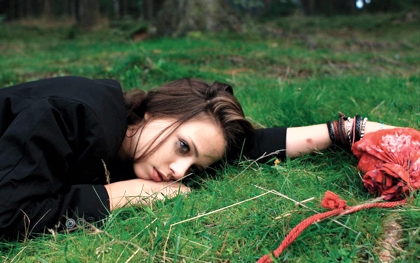
Dreileben 1: Beats Being Dead
I caught up with the first part of the Dreileben trilogy, Beats Being Dead, and admired the way Christian Petzold gets his tentative young lovers into very bright uniforms – hospital orderly and hotel maid – that make them stand out in a dark forest more than any red hood. The film’s oblique plotting succeeded in intriguing me enough to keenly anticipate the next two parts.
When it comes to fascination, though, Yorgos Lanthimos’s Alps takes the whole biscuit barrel. Plausibility is never an issue here because artifice in behaviour is the film’s core subject. ‘The Alps’ are a strange alliance of two hospital workers (one male, one female) and a young woman gymnast and her menacing male coach. Collectively they offer a service to grieving relatives in which they substitute for the dead person to aid the process of grief. Cue many seemingly absurd scenes of re-enactment – the kind of banal domestic conflict that people miss when it’s gone – but the challenge is to claim that such behaviour is any more absurd than other real-life therapies.
The one aspect of Alps not subject to a feeling of absurdity is the threat of violence from the men in the group, which gives every scene a palpable tension. One of the film’s most remarkable features is the utterly convincing performance – in a film that’s trying not to be authentic – of Ariane Labed (the star of Attenberg) as the gymnast. When I met her in the Jameson guest bar after the screening she told me that she trained for two years for the role. I asked if she was still in training. “No, no, never again,” she said. “I hate gymnastics”.
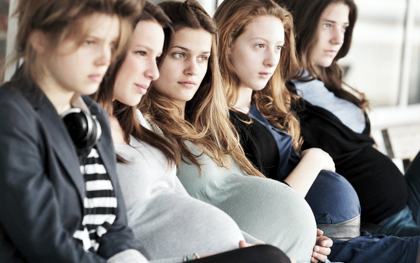
17 Girls
Based on a real-life American case, the French production 17 Girls, written and directed by Delphine and Muriel Coulin, relocates its schoolgirls trying to resist their fate to the run-down port of Lorient. When alpha-female Camille (Louise Grinberg) discovers she’s pregnant, she persuades her closest friends to do the same. Soon the school has to cope with an epidemic of pregnancies. A one-idea film it may be, but it amplifies that idea imaginatively to create a well-observed and well-acted ensemble drama about teenage dreams in a dead-end town.
Equally concerned with young girls and their futures is She Monkeys, an impressionistic portrait of a small-town crush from the Swedish director Lisa Aschan. Two lovely young girls, rivals for a small-town equestrian acrobatics team, become fascinated with each other and develop a curious attachment of mixed emotions and confused urges. This main strand of the film is superbly handled, but I was less sure about a subplot about a seven-year-old sister who insists on exploring her sexuality at that tender age. Then again, it was obviously meant to be unnerving and it succeeded.
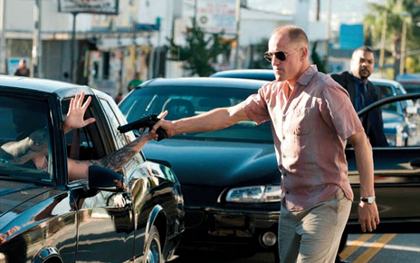
Rampart
Rampart, which reunites most of the team (Oren Moverman, Woody Harrelson and Ben Foster) that made The Messenger a few years back, looked in advance like my kind of movie. It has Harrelson in fearsome form riffing on the kind of troubles that James Ellroy likes to obsess about in his crime novels (Ellroy originated the script), especially in his stunning autobiography My Dark Places. In Rampart, Harrelson plays a cop whose racism makes him a prime candidate to be investigated, thereby taking some of the press heat away from the huge suspicion of police corruption going on in the Rampart division of the LAPD.
Regrettably, as stylishly shot on the new Alexa camera as Rampart was, I believed hardly a single moment. Every character seemed like a set of attitudes, none a believable person. I said this quietly to the Festival Director Sandra Hebron, and she disagreed (as she should), arguing interesting parallels between Rampart and Shame in the two portraits of male self-disintegration.
That’s enough about my LFF, but let me also relate an observation made by my wife Kate Ogborn. Festivals always throw up sub-themes, coincidental connections between movies, and usually they’re of the bizarre variety – a preponderance of pigeons, or a rash of beach drownings. But every one of the five titles Kate has seen (so far, as I write this) captures an event that perhaps ought to be a regular part of cinema but is rarely is: oral sex performed on a woman by a man. 360, Shame, The Loneliest Planet, Rampart and Alps have all shown men prepared to lie down for the cause. I don’t think Kate’s seen The Bitter Taste of Freedom yet, but you never know.
